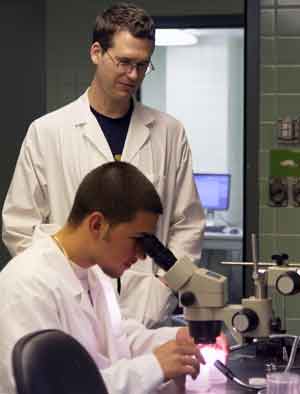 Assistant Professor of Psychology Neil Schmitzer-Torbert has been awarded a $270,000 grant by the National Institutes of Health to continue his and his students’ research on the effect of addictive drugs on the brain’s memory systems.
Assistant Professor of Psychology Neil Schmitzer-Torbert has been awarded a $270,000 grant by the National Institutes of Health to continue his and his students’ research on the effect of addictive drugs on the brain’s memory systems.
The three-year grant, awarded in May, will pay for three Wabash students per summer to work with Schmitzer-Torbert, who has high expectations for both the study and the students working with him.
“The benefits of having a program for research at a college like Wabash is to get students involved in work that will be of interest to a community larger than just the people doing the work,” Schmitzer-Torbert says. “And the professional community will be very interested in the outcome of this research.”
Dean of the College Gary Philips proclaimed the award “exceptionally good news.
“It acknowledges the quality of the science pursued by Neil and the Psychology Department: the national competition for these grant dollars was fierce and only the most worthy projects and project investigators get selected.“
Rats are the subjects of the research, but its implications strike much closer to home.
A behavioral/cognitive neuroscientist by training, Schmitzer-Torbert is studying the effects of cocaine on the rats' behavior. The professor and his students have already observed that cocaine injected into rats causes habitual and rigid behavior, and last year they discovered that the action of cocaine on habit learning involves an area in the brain called the prefrontal cortex.
“Our hope is that this type of work can be generalized to a better understanding of the different ways our own behavior might be controlled by different and distinct memory systems,” the professor says. “This could lead to a better understanding of what is actually going on in the brain when we exhibit our own rigid and habitual behaviors.”
In other words, Schmitzer-Torbert’s research has a lot more to do with us than with cocaine-injected rats.
“Most of us will exhibit rigid and habitual behavior, especially when we’re distracted,” he explains. “For me it happens when I’m driving to the store, I get distracted, and I find myself pulling into the college parking lot for no reason. This research may be generalized to help us better understand what goes on in the brain during those moments. That may have broader implications for understanding who we are and for intervening when those kinds of behaviors cause problems.
“For example, every summer we’ll read of a child who gets left in a car for the day accidentally by his parents and suffering, maybe dying. It’s often the parent who doesn’t normally take the child to school or daycare who takes the child that day—it’s an atypical day. The child falls asleep in the back seat, the parent falls into his or her normal routine and drives on to work, never thinking about it again.
“It can have terrible consequences, but the fact is that when behavior is very regular over long periods of time, it’s very easy to activate those patterns of behavior. If we knew more about the conditions under which those behaviors are activated—and that’s the question we’re getting at in this research—we might be able to find ways to help people avoid those situations.”
The research is already benefiting Wabash students, who have presented preliminary results at national conferences, presented posters on campus about the work, and gained skills that will serve them well, whether or not they decide to pursue graduate work in psychology.
Steven Apostolidis ’12 is returning to the professor’s lab this summer after an eventful first year with the professor.
“In high school I never imagined I would be partaking in research, let alone brain surgery,” says Apostolidis, who learned the techniques from Schmitzer-Torbert last June. “When I learned I would be a research assistant, I expected to be observing, cleaning, and assisting with small tasks. From day one of the internship, I began to realize that would not be the case.”
“Believe it or not, the brain surgery we do on rats for this study is relatively straightforward, and this is a lab skill students can really benefit from,” Schmitzer-Torbert explains. “I had Steven observe the first procedure, and on the second I asked if he wanted to perform several steps, and by the third he was able to do pretty much the whole surgery.
“When I was in grad school, the labs I worked in were interested in training students, but that wasn’t their primary goal, so undergraduates fell into roles that were close to being technicians. They didn’t have a broader understanding of the purpose of the research. Whereas at Wabash, when we bring in a grant we’re trying to answer interesting questions in science. But if we did that and, at the end of the day, the students didn’t feel like the were partners in the work, then I would view that as a failure.”
Dean Phillips sums up the benefits of Schmitzer-Torbert’s grant: “Beyond the recognition this brings to Neil's scientific work and to the College, the grant provides new opportunities for Wabash students to engage in primary research with an outstanding Wabash teacher/scholar. Such opportunities prepare our students for success after Wabash by continuing the long tradition of first-rate science education.”
In photo: Professor Neil Schmitzer-Torbert works with research intern Steven Apostolidis ’12 in the Behavioral Neuroscience Laboratory in Baxter Hall.